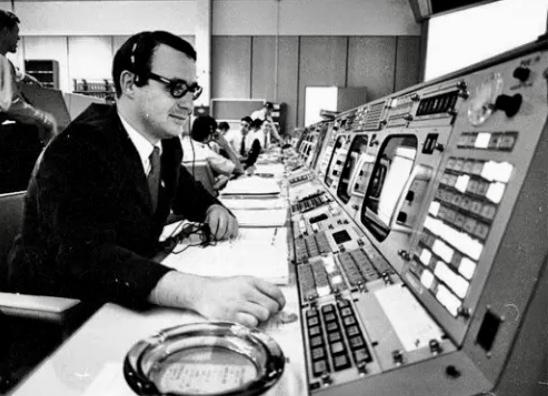Steve Bales isn’t a household name like say, Neil Armstrong or Buzz Aldrin. But you could say that he was as important to the historic lunar landing on July 20, 1969, as those two astronauts were.
During the powered descent of the Lunar Lander, which housed Armstrong and Aldrin, two warning lights unexpectedly flashed on the control panel at Mission Control in Houston. They were 1201 and 1202 alarms.
Bales, 26 at the time, quickly had to make a quick decision whether to abort the landing or override the warnings with a “go.” From hundreds of simulations the months before the actual flight, Bales suspected that the warnings might be false alerts due to the fairly primitive computers being overloaded with commands.
So, after consulting with the computer guys, in a loud and confident voice, he barked, “Go.” Had he not, history would not be what it is today. Perhaps the U.S. would eventually have reached the moon on a future mission, but not on Apollo 11.
With the 56th anniversary of the Apollo 11 landing later this month, I had the rare opportunity to chat with Bales, now 82, to recall that pivotal time in Cold War history. Following are edited excerpts from a longer phone conversation. This is Part 1 of a multi-part series.
Jim Clash: What was your first thought when the initial 1201 warning came up?
Steve Bales: We had made up a cheat sheet in our many simulations the months before with rules to carry out for various scenarios. Thank God we had that. So bang, just as the first 1201 pops up, Jack Garman, whose big job was to oversee the computer, and I were in contact. About 10 seconds after the alarm he said, “Steve, it’s an overflow.”
Then I looked at my cheat sheet, which was under some papers I had there, and found what to do. First, I had to make sure everything else was running okay with the craft – altitude, speed, vehicle control, and the rest of it – and it was all okay.
Just about the time I was about to say “go” to [Flight Director] Gene Krantz on the radio loop, Neil Armstrong called down and asked us to give him a reading on the alarm. Now Neil never talked. His job as commander was to fly. Buzz [Aldrin] did most of the talking. So if Neil was talking, it meant he was anxious, that it was serious.
Charlie Duke, the cap-com, who could hear our conversation, called Neil privately to reassure him we had him “go” on that alarm. If we had waited another five seconds [to tell Neil], I don’t know what would have happened. There were other anomalies during the last 7,000 feet of descent, but at least we understood the 1201.
Then Buzz called up the radar and bang, we got a 1202. Looking at the radar put just enough load on the computer to push it over 100 percent for two seconds. So we figured out that even the smallest command put the computer into overload. We asked Buzz not to call up the radar anymore, that we were watching from the ground. No more alarms for the time being, thank God, and I thought, “Wow.”
Clash: Any letdown later in life after Apollo 11 and that temporary drama?
Bales: No, not at all. Now if hadn’t gone well, that would have been a different story. One guy who interviewed me afterwards wrote that I probably would have committed suicide. I wouldn’t have, of course, but I don’t know where I would have lived. “Failure” Kranz and “Dumb” Steve would have had to find some remote place to hang out [laughs].
Kranz had told us that failure was not an option, and that’s his legacy. If I had screwed up, it would have messed him up at the same time. All I can say is that I was a grateful young man. In fact, the older I get the more grateful I am [laughs].
Clash: You were only 26 at the time. I heard that President Richard Nixon once came to Mission Control and remarked, “Where are all of the old men?” True?
Bales: I was there. I think it was 1968 and he was running for office. I do not believe he was President at the time. [Former Vice President] Hubert Humphrey was also there, but somewhat earlier. Nixon came in to the front control room and looked around. I was in one of the back rooms doing simulations that day. When they showed Nixon the back rooms, he said, “You are all young, too. Where are the old guys in this building?” He was shocked.
At a conference in Los Angeles after the mission, Nixon said that he admired Mission Control and especially the youth. He was serious. I think our average age then was mid-20s.
Clash: In a sense, your risky “go” call that day made you a bit of a celebrity. Ever sign an autograph for someone?
Bales: All the time. I still get requests. I live in a South Jersey now, not a populated area, but people find me.
Clash: Looking back, what was one of the more significant things Apollo 11 is remembered for?
Bales: Back then, international news was usually crummy. But this captured the attention of the world just like that, and it was not bad news. It was uplifting. That was what was really unique about Apollo 11. Apollo 8 [first flight around the moon] and Apollo 13 [returning to Earth safely after major flight problems on the way to the moon] caused international attention, too, but not to the extent of Apollo 11.

